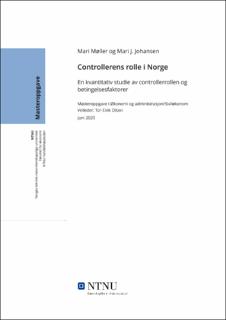| dc.contributor.advisor | Olsen, Tor-Eirik | |
| dc.contributor.author | Møller, Mari | |
| dc.contributor.author | Johansen, Mari J. | |
| dc.date.accessioned | 2021-09-14T17:15:24Z | |
| dc.date.available | 2021-09-14T17:15:24Z | |
| dc.date.issued | 2020 | |
| dc.identifier | no.ntnu:inspera:55685018:60640570 | |
| dc.identifier.uri | https://hdl.handle.net/11250/2777162 | |
| dc.description.abstract | Begrepet controller ble først benyttet mot slutten av 1800-tallet, og omhandlet opprinnelig en rekke oppgaver knyttet til økonomi- og regnskapsfunksjoner. Controllerrollen har i den senere tid blitt kritisert for å være for fokusert på historiske data og finansiell informasjon, noe som kan illustreres ved Friedman og Lyne`s (1997, s.19) definisjon av den tradisjonelle controlleren som: “an accountant who produces financial information which is regarded as of little use in efficiently running the business and, as a result, its production has become an end in itself”. Denne kritikken har bidratt til utviklingen av en controllerrolle som har økt fokus på forretningsorientering, noe som strekker seg betydelig utover rutinemessige og tekniske regnskap (se for eksempel Burns og Baldvinsdottir, 2005). På bakgrunn av dette ønsker vi å besvare følgende problemstilling:
“Hvilke controllerroller finner vi i Norge i dag, og hvilke faktorer påvirker den nye controllerrollen?”.
Vi har gjennomført en kvantitativ studie for å besvare problemstillingen, hvor totalt 496 controllere eller ansatte med controlleroppgaver fra mellomstore og store bedrifter svarte på spørreundersøkelsen. Datamaterialet ble bearbeidet gjennom statistiske analyser og videre diskutert med utgangspunkt i betingelsesteori og tidligere forskning.
I studien ble det identifisert fire controllerroller, deriblant en forretningspartnerrolle som i stor grad kan karakteriseres som den nye controllerrollen. Funnene viser at controllere eller ansatte med controlleroppgaver i Norge bruker tid på både arbeidsoppgaver knyttet til den tradisjonelle controllerrollen og oppgaver assosiert med den nye controllerrollen Vi finner at betingelsesfaktoren opplevd konkurranseintensitet har en sterk påvirkning på den nye controlleren, samt en av rollene vi identifiserte som mer tradisjonell, informasjonsforsyner. I tillegg identifiserte vi en sammenheng mellom digitalisering og en av de mer tradisjonelle rollene vi identifiserte som regnskapsfører. | |
| dc.description.abstract | The term “controller” was first mentioned at the end of the 19th century, and was originally concerned with several tasks related to economic and accounting functions. The controller role has lately been criticized for being too focused on historical data and financial information. This can be illustrated by Friedman and Lyne`s (1997, p.19) definition of the traditional controller as: “an accountant who produces financial information which is regarded as of little use in efficiently running the business and, as a result, its production has become an end in itself”. This criticism has contributed to the development of a controller role with increased focus on business orientation, which extends considerably beyond routine and technical accounting (example Burns and Baldvinsdottir, 2005). Based on this we desire to answer the following research question:
“What controller roles can be identified in Norway today, and what are the driving factors affecting the new controller role?”
We have conducted a quantitative study to answer our research question, where a total of 496 controllers or employees with controller tasks working at medium and large companies answered our survey. The data was processed through statistical analyzes and further discusses based on Contingency Theory and previous research.
We managed to identify four controller roles, including a business partner role which largely can be characterized as the new controller. Our findings show that controllers or employees with controller tasks in Norway use time on both tasks related to the traditional controller role and tasks linked to the new controller role. We also found that the contingency factor experienced intensity of competition has a strong effect on both the new controller role and on one of the roles that we identified as more traditional, informasjonsforsyner. In addition, we identified a relationship between digitalization and one of the more traditional roles we identified as regnskapsfører. | |
| dc.language | | |
| dc.publisher | NTNU | |
| dc.title | Controllerens rolle i Norge - En kvantitativ studie av controllerrollen og betingelsesfaktorer | |
| dc.type | Master thesis | |
